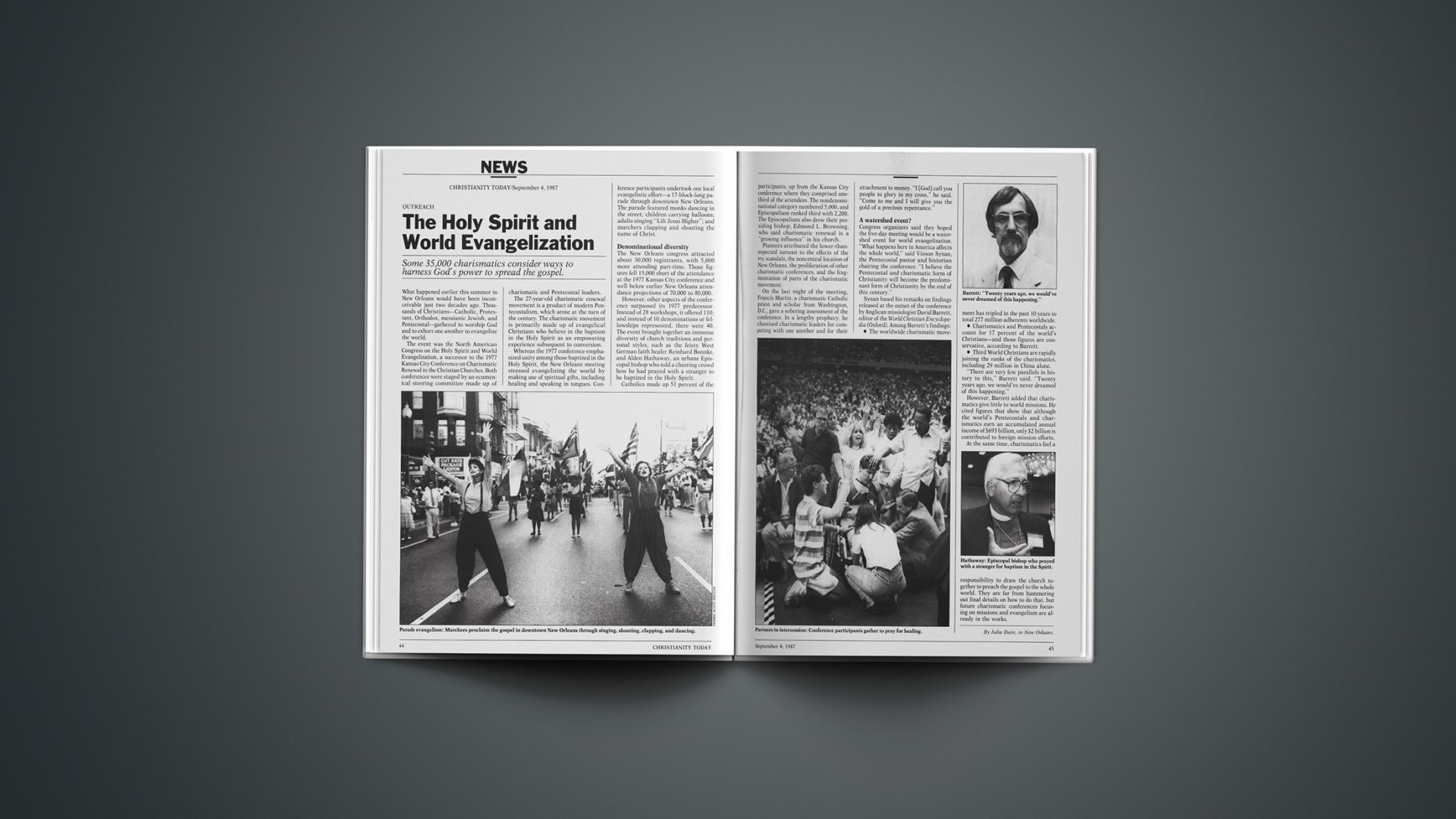What happened earlier this summer in New Orleans would have been inconceivable just two decades ago. Thousands of Christians—Catholic, Protestant, Orthodox, messianic Jewish, and Pentecostal—gathered to worship God and to exhort one another to evangelize the world.
The event was the North American Congress on the Holy Spirit and World Evangelization, a successor to the 1977 Kansas City Conference on Charismatic Renewal in the Christian Churches. Both conferences were staged by an ecumenical steering committee made up of charismatic and Pentecostal leaders.
The 27-year-old charismatic renewal movement is a product of modern Pentecostalism, which arose at the turn of the century. The charismatic movement is primarily made up of evangelical Christians who believe in the baptism in the Holy Spirit as an empowering experience subsequent to conversion.
Whereas the 1977 conference emphasized unity among those baptized in the Holy Spirit, the New Orleans meeting stressed evangelizing the world by making use of spiritual gifts, including healing and speaking in tongues. Conference participants undertook one local evangelistic effort—a 17-block-long parade through downtown New Orleans. The parade featured monks dancing in the street; children carrying balloons; adults singing “Lift Jesus Higher”; and marchers clapping and shouting the name of Christ.
Denominational Diversity
The New Orleans congress attracted about 30,000 registrants, with 5,000 more attending part-time. Those figures fell 15,000 short of the attendance at the 1977 Kansas City conference and well below earlier New Orleans attendance projections of 70,000 to 80,000.
However, other aspects of the conference surpassed its 1977 predecessor. Instead of 28 workshops, it offered 110; and instead of 10 denominations or fellowships represented, there were 40. The event brought together an immense diversity of church traditions and personal styles, such as the feisty West German faith healer Reinhard Bonnke, and Alden Hathaway, an urbane Episcopal bishop who told a cheering crowd how he had prayed with a stranger to be baptized in the Holy Spirit.
Catholics made up 51 percent of the participants, up from the Kansas City conference where they comprised one-third of the attendees. The nondenominational category numbered 5,000, and Episcopalians ranked third with 2,200. The Episcopalians also drew their presiding bishop, Edmond L. Browning, who said charismatic renewal is a “growing influence” in his church.
Planners attributed the lower-than-expected turnout to the effects of the PTL scandals, the noncentral location of New Orleans, the proliferation of other charismatic conferences, and the fragmentation of parts of the charismatic movement.
On the last night of the meeting, Francis Martin, a charismatic Catholic priest and scholar from Washington, D.C., gave a sobering assessment of the conference. In a lengthy prophecy, he chastised charismatic leaders for competing with one another and for their attachment to money. “I [God] call you people to glory in my cross,” he said. “Come to me and I will give you the gold of a precious repentance.”
A Watershed Event?
Congress organizers said they hoped the five-day meeting would be a watershed event for world evangelization. “What happens here in America affects the whole world,” said Vinson Synan, the Pentecostal pastor and historian chairing the conference. “I believe the Pentecostal and charismatic form of Christianity will become the predominant form of Christianity by the end of this century.”
Synan based his remarks on findings released at the outset of the conference by Anglican missiologist David Barrett, editor of the World Christian Encyclopedia (Oxford). Among Barrett’s findings:
- The worldwide charismatic movement has tripled in the past 10 years to total 277 million adherents worldwide.
- Charismatics and Pentecostals account for 17 percent of the world’s Christians—and those figures are conservative, according to Barrett.
- Third World Christians are rapidly joining the ranks of the charismatics, including 29 million in China alone.
“There are very few parallels in history to this,” Barrett said. “Twenty years ago, we would’ve never dreamed of this happening.”
However, Barrett added that charismatics give little to world missions. He cited figures that show that although the world’s Pentecostals and charismatics earn an accumulated annual income of $693 billion, only $2 billion is contributed to foreign mission efforts.
At the same time, charismatics feel a responsibility to draw the church together to preach the gospel to the whole world. They are far from hammering out final details on how to do that, but future charismatic conferences focusing on missions and evangelism are already in the works.
By Julia Duin, in New Orleans.










